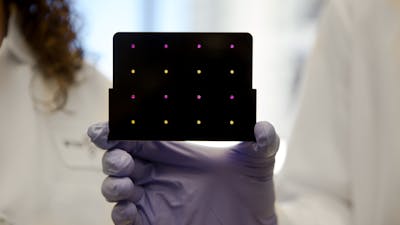- Easily deployable for long-term storage without refrigeration
- Programmable for broader use in a variety of application areas

Paper-Based Diagnostics
Low-cost, fast, and simple biomolecular devices for global healthcare and at-home diagnosis
Want to license this technology?
Please get in touch to learn more about our intellectual property portfolio and licensing opportunities for Paper-Based Diagnostics.
Want to license this technology?
Please get in touch to learn more about our intellectual property portfolio and licensing opportunities for Paper-Based Diagnostics.
With the imminent threat of new pandemics and frequent disease outbreaks exemplified by the recent Ebola and Zika epidemics, there is a growing need for low-cost, easily deployable and simple-to-use diagnostic tools. The Wyss Institute has developed paper-based synthetic gene networks as a next generation diagnostic technology for use in global healthcare crises and patient care. This new type of diagnostic platform may also provide patients and consumers with simple-to-use tests for a variety of other health problems.
Health care professionals collect samples and subject them to a variety of tests to determine whether an individual is infected with a certain pathogen. Among the challenges with conventional diagnostic testing are costs, delivery times, storage and shelf-lives of reagents, as well as the requirement for trained professionals who can perform and analyze these tests. To contain the risk of spread during outbreaks, infected individuals must be diagnosed quickly and ideally with diagnostic tools that can be stored at room temperature, give a rapid and simple readout of results and are user-friendly even to untrained individuals.
To address these requirements, a team at the Wyss Institute has pioneered the use of paper-based synthetic gene networks as programmable molecular devices, which currently combines two novel technologies: (1) newly designed cell-free synthetic biosensors that are able to detect the presence of pathogen-derived RNA molecules and that couple detection events to the production of a colored or fluorescent indicator protein, and (2) embedding of the biosensors in paper that can be freeze dried for long-term storage without refrigeration; these biosensors are fully functional upon rehydration with collected patient samples.
After proof-of-concept studies with successful detection of Zika and Ebola, the Wyss group is adapting this technology to identify other viruses like Human Papilloma and Hepatitis C virus as well as the composition of the gut microbiome. In addition, the team is further engineering this tool to detect different molecular classes beyond nucleic acids such as proteins and metabolites – efforts that can empower patients and consumers with self-diagnostic tests in a variety of diseases and conditions. Furthermore, because paper-based synthetic gene networks are inexpensive and programmable, there is untapped potential for broader use in a variety of application areas such as agriculture and pet health.
At the high level it is a system that harnesses the power and versatility of biology to adapt biomolecular components in a programmable, cell-free and freeze-dried format that is essentially easy to use, inexpensive and does not require refrigeration.
Want to license this technology?
Please get in touch to learn more about our intellectual property portfolio and licensing opportunities for Paper-Based Diagnostics.